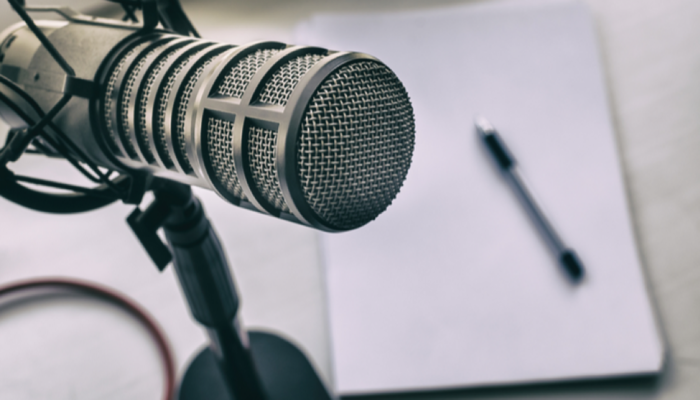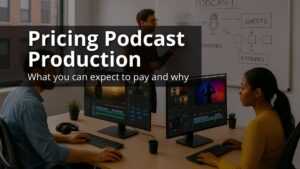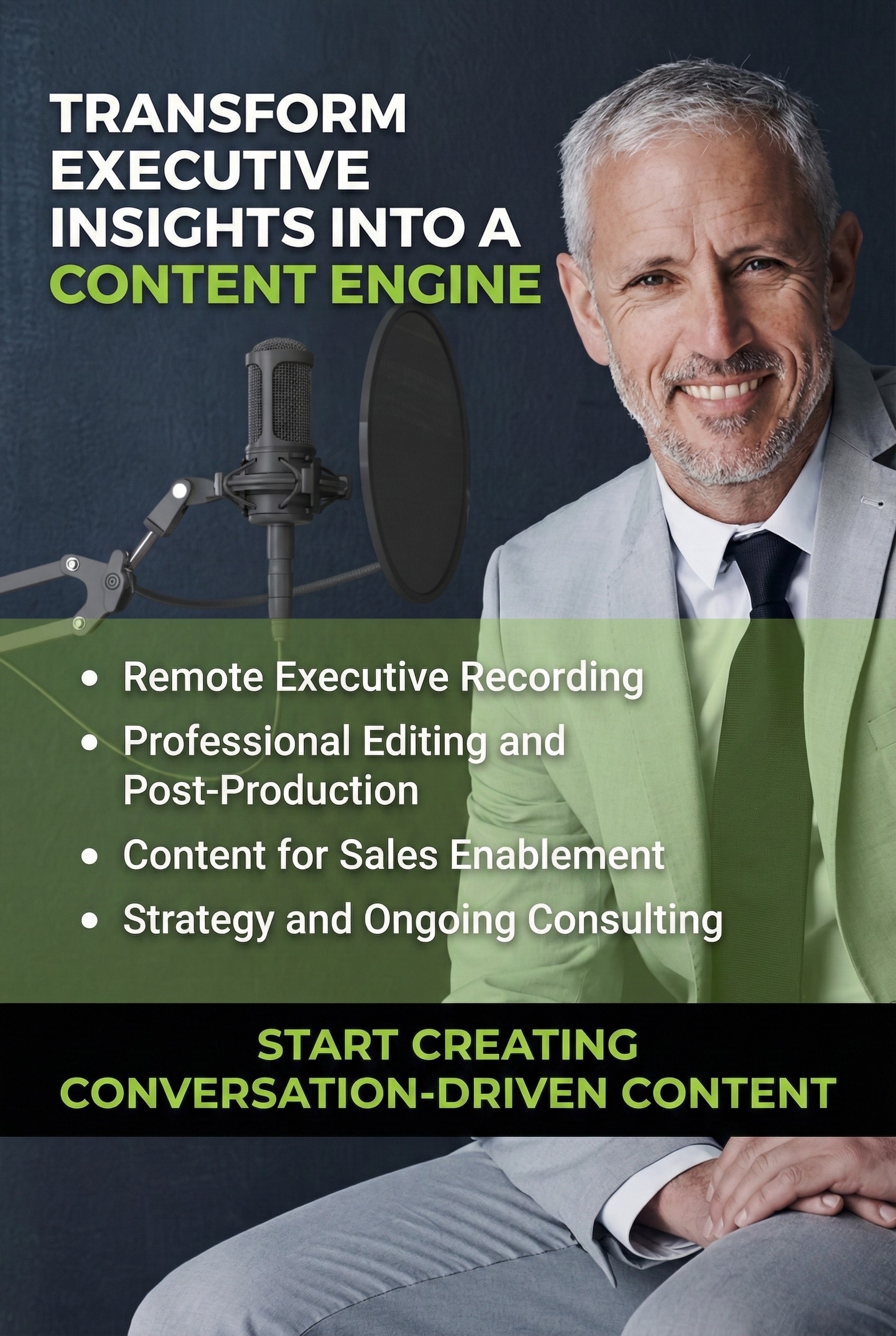There are many ways to put content out on the internet, ranging from blogs to social media to guest posts on somebody else’s site. One newer, but not new method is to create a podcast, moving your content into the audio realm. This article will talk about what podcasts are and how you can start one.
Even with its popularity, some may be asking – What is a podcast? A podcast is a personalized version of internet radio in which chosen audio or video content is delivered on-demand to your device which can be stored there for off-line listening at your convenience.
A podcast is often referred to as a spoken word series, episodic in form and distributed digitally on demand. The term “podcast” was coined back in 2004 by Ben Hammersley in an article entitled Audible revolution. The term, “pod” comes from Apple’s famous iPod, while “cast” comes from radio’s broadcast system.
Podcasts focus on a particular subject, which can range from science fiction short stories to marketing to history. They can best be viewed as a form of talk radio that is provided over the internet, on demand, and in a format anyone can listen to. Traditionally, podcasters do not charge for content, although they often request donations or tips. Podcasts are also used to market other products.
A good way of describing podcasts to someone who has never heard about them is that they are like on-demand radio of their chosen favorite shows. But don’t let yourself or others be fooled into thinking that’s all they are. There are some added benefits and major differences.
Is a Podcast Just Audio?
Podcasts are traditionally audio, but video podcasts do exist. The video element is generally simple (talking heads), but video podcasts might also include animation and graphics, or be recorded in interesting locations.
Video podcasts tend to attract a slightly different audience; pure audio podcasts are particularly popular with people with long commutes, long distance drivers, etc., while video podcasts often bring in a slightly younger crowd who happily sit watching YouTube.
As long as it has a subject, is based on spoken word, and provides information, it’s still a podcast.
Why Are Podcasts So Popular for Listeners?
- New episodes can be automatically delivered to your device without you having to search for them
- No app is required, but they can be listened to through apps already on your phone
- You can listen to a podcast on your own time rather than having to tune in at a certain hour
- No internet connection is required because episodes can be stored on your device
Why Are Podcasts So Popular for Content Creators?
- Podcasts appear in Google search results – and can be played from there!
- They are highly shareable – the whole show or a single episode
- You own the content and decide when it is distributed
- Creators can grow a fan base outside of their known audience
How Do Podcasts Work?
Podcasts work by combining the freedom associated with blogging with the benefits of digital audio and, in some cases, video technology. This, in turn, provides an almost endless supply of content for people to consume. Some even go as far as saying that podcasts are democratizing what was previously a corporate-dominated radio world.
As a free service, podcasting allows internet users to stream or download audio files from a host website and listen on smartphones, computers, laptops, automobiles, and smart devices. Users can either download the podcast on-demand, or they can subscribe via an RSS (Really Simple Syndication) feed. This will automatically download the podcast to their device for later viewing.
Since podcasts don’t rely on ratings as radio broadcasts do, the subject matter can cater to a more highly-targeted audience. This makes it a great tool for those looking to become thought leaders in their respective industries. It’s also great for building trust and drawing in a loyal and devoted group of listeners.
How Do You Make Podcasts?
Basically, there are three ways to go about making a podcast. You can make it entirely in-house, you can outsource the production, or you can combine elements of both in-house production and outsourcing. Below are several key elements you need:
- Equipment – Investing in decent equipment and editing software is the first step in creating a podcast in-house. In this category, we can also include a dedicated space for recording. This space needs to be free of any background noise or unexpected interruptions, and make sure it doesn’t amplify reverberations and echoes.
- Consistent Content Topics – Well researched and consistent content is key to success. You can’t expect a decent following if you’re posting haphazardly or you don’t have anything of value to say. Thorough research, talking points, and a consistent production schedule are needed. Inviting experts and thought leaders on a regular basis will go a long way.
- A Post-Production Producer – Post-production involves editing, mixing, adding music transitions and news clips, and everything else required to create cohesive episodes. Producers can do these things themselves or oversee a production team.
- A Hosting Service – Although you can host the podcast on your website, it’s highly discouraged due to the required bandwidth (data throughput) that will be needed. What you need is a hosting service from where it can be streamed directly to media players like iTunes, Spotify, iHearRadio, and Google Podcasts – to name a few.
- Time – Last but not least, you will need time. Many make the mistake of not allocating enough time to set everything up, greet guests, go over the talking points, record, edit, and account for any unforeseen circumstances. A 30-minute episode can take more than an hour and a half to shoot, let alone edit.
How Do You Record a Podcast?
Recording your podcast is the easiest part, but there are different things you have to consider. There are four main options:
In a Studio
You can either set up your own studio if you have space in your home or office, or find one for rent in your area. For non-commercial podcasts, libraries sometimes have recording space.
Remotely with a Producer
Studios are expensive. Many hosts record their podcast remotely with the producer taking the feed over the internet and doing the editing from there. This also has the advantage of being able to record from cool locations, and invite guests without anyone having to travel.
Remotely with your Co-Host
If you have a co-host or co-hosts you can record segments or conversations remotely and, again, it can be produced from files transmitted over the internet. This does require that you have a good connection.
Through an App
There are also podcast recording apps that vary in price and quality. They can help you get started, but are ultimately not a substitute for a good editor.
How Do You Listen to Them?
Accessing podcast shows and episodes is easy because there are so many ways to recieve them. Most mobile phones and smart devices come with the ability to discover and listen to shows without the need for additional apps.
Users can either listen to it through their web browser or have their preferred “podcatcher” such as iTunes, Spotify, or Google Play download it for them automatically. These tools will detect every time a new episode is available and will download it on the user’s behalf for later viewing.
iPhone or iPad users have The Podcast App, which allows you to search for different podcasts, stream specific episodes, and subscribe. Android users can use CastBox or Podcast Go. These are two of the leading free podcast apps for Android.
There are a variety of ways people listen to podcasts, with many options for listeners. However, there are three main ways people listen to podcasts.
Podcast Listening Apps
Podcast listening apps are available for both iOS and Android mobile devices. Many apps are connected to their own library of podcasts for listeners to explore. You want to get your podcast into as many of these libraries as you can, as only the most avid listeners have more than one app.
The app will allow users to subscribe to your podcast, with new episodes appearing in their feed. They can even add your podcast to playlists.
Your Website
Both pure audio and video podcasts can be posted to your website for listeners to find. This is a useful option for people who listen to podcasts while eating lunch at their desk.
It also allows people to find your podcast and they can then look for it in an app and subscribe to it. Because podcasts are large files, smaller companies and individuals might consider using a podcast hosting service such as Libsyn, which also allows for subscriptions, various distribution models, and monetization of your podcast.
YouTube
If you have a video podcast, then the best solution is to create a YouTube channel. YouTube has a large amount of traffic and allows you to monetize your video by displaying ads before and after.
Be aware that YouTube does not allow you to directly monetize videos that are or appear to be aimed at children, which is a consideration if your podcast topic is kids’ clothing, toys, etc.

Who Listens?
In terms of income, podcast listeners are 32% more likely to make over $75,000 per year, 37% over $100,000, and 45% over $250,000. Also, listeners are shown to be more active on social media than non-listeners and tend to follow companies and brands on social networks.
Statistically speaking, 51% of the entire American population has listened to at least one podcast, as of 2019. This is up 7 percent from 2018 (44%) and 11 percent (40%) the year prior.
This year, roughly 144 million have listened to a podcast, 90 million doing so in the last month. Of these, 62 million listen to podcasts on a weekly basis, while 16 million describe themselves as being “avid podcast fans.”
On average, listeners subscribe to around 6 shows and listen to about 7 shows per week. Over half (56%) are male, while 27% of US podcast listeners have a 4-year college degree.
This is 8 percent higher than the national average. This means that 45% of podcast listeners are more likely to have a college degree, 56% more likely to be undergraduates, and 68% to be postgraduates.
Why Are They So Popular?
Podcasting has gained popularity due to the ability to passively consume content that you have personally selected. Unlike video or text, you can listen while doing other things such as commuting or working out. Plus, having the latest episodes automatically delivered makes it highly convenient.
There’s no denying the fact that this form of content has exploded in popularity in recent years. For the podcast consumer, they offer easily-accessible information and/or entertainment in bite-size chunks.
Also, it’s presented in an entertaining, narrative way, which is always a plus. Podcasts allow us to dive deeper into many topics in an easily accessible medium.
And there’s also a personal element to them. They are a means of coming across like-minded individuals who share our interests and ideas.
For brands, podcasts serve as great marketing tools. They help with increasing reach and audience while being relatively inexpensive to create. They help build trust and reputation, establishing you as a thought leader in your respective industry.
Most importantly, podcasts help educate prospective customers about your products and industry as a whole. Audio content through this delivery method will easily find its place in any company’s marketing strategy.
How Do I Start a Podcast?
It used to be that starting a podcast required substantial technical knowledge and a significant outlay in terms of software, equipment, and furnishings. Nowadays, it seems that anyone can do it. There are three main options:
Do It Yourself
This often appears to be the cheapest option, but isn’t always. The equipment to set up a podcast can range from $100 to $5,000 if you want high-end gear. This does include equipment you might already have, such as a decent computer. You might also spend money on art and music.
Also, doing it yourself requires having a good place to record, which not everyone does. It also requires having, or learning, the skills of a sound editor and producer, which are highly specialized.
Hire an Agency for Turnkey Podcast Management
If you do not want to set up a studio and prefer to focus only on recording, you can hire an agency. The agency will take care of everything, including recording your podcast, editing and producing it, and putting it out on the major podcast platforms.
They may also be able to help you repurpose audio to create even more content, such as making good use of outtakes.
Hire an Editor
The in the middle method is to buy the equipment, set up the studio, do your own recordings, and then hire somebody else to do the editing. The editor will handle your audio production, fix any problems, cut out unneeded material, etc.
Their job is not to change your podcast, but to make it “pretty” and help you put out a quality product. This is more work than hiring an agency, but can be cheaper if you feel comfortable handling everything else yourself.
What Are the Different Types of Podcasts?
There are a number of different types of podcasts, some of which might sometimes overlap with each other. The most common ones are:
- Branded podcasts. These are podcasts that are specifically designed to provide information about a brand or company.
- Hobby podcasts. Hobby podcasts talk about a hobby and give information and often tips. For example, somebody might have a knitting podcast.
- Industry podcasts. Industry podcasts provide the knowledge needed in a specific industry and are a good idea for business-to-business podcasts.
- News podcasts. Some podcasts provide insight and analysis into the news.
- Narrative nonfiction podcasts tell true stories (such as true crime) or provide information in an entertaining manner.
- Fiction podcasts provide fiction either episodically (as short stories) or with a longer arc (pod novels).
Depending on your business’ needs you might do a branded podcast or something else, such as a yarn company doing a knitting podcast.
How Do You Measure the Success of a Podcast?
How you measure the success of your podcast depends on a few things:
- What type of podcast you are doing.
- Why you are doing the podcast.
- How your podcast is distributed.
- Your call to action strategy.
- How you promote your podcast.
In most cases, the easiest way to measure success is by tracking your number of listeners and downloads. You can also put discount codes in your podcast to help you measure conversions. Some podcasts might directly be connected to sales, but most are a way of presenting yourself as an expert in the field.
What Podcast Formats Are There?
When you have decided to do a podcast and what type, you need to pick your format. Here are the five most common forms:
- Conversational co-host. This means you have two or more people who discuss the issue at hand. This is best for news and analysis podcasts.
- Solo podcast. A single host talks. This works well for hobby podcasts, where the host might be talking through how to do things.
- Interview. You have a different guest on each episode and interview them.
- Scripted. A scripted podcast is kind of like an audio drama, and is best for podcasts which tell a story.
- Repurposed content. Some podcasts might be mostly content taken from elsewhere.
Your podcast might be any of these formats, or you might even switch things around, such as doing conversational most of the time with occasional interviews. Podcasts are growing in popularity, and likely to continue to do so. They can be a huge boost to your marketing strategy.
You need to decide how much budget you have, which also determines how high quality a product you can put out, and what type of podcast you want. One of the best ways to put out a quality podcast without putting in a lot of work is to hire a turnkey agency who can handle everything for you.
Ready to learn more about starting your own podcast? Talk to a professional Content Monsta!
- Building a Content Engine for Your CompanyIf you’re creating content for business and not seeing results, it’s …
- The SAUCE Framework For Better Content MarketingMy niece has been one to keep a hot sauce bottle …
- How Much Does it Cost to Hire a Podcast Production Company?A quick breakdown of what it should cost to hire a podcast production company to help you with your podcast production and promotion.






